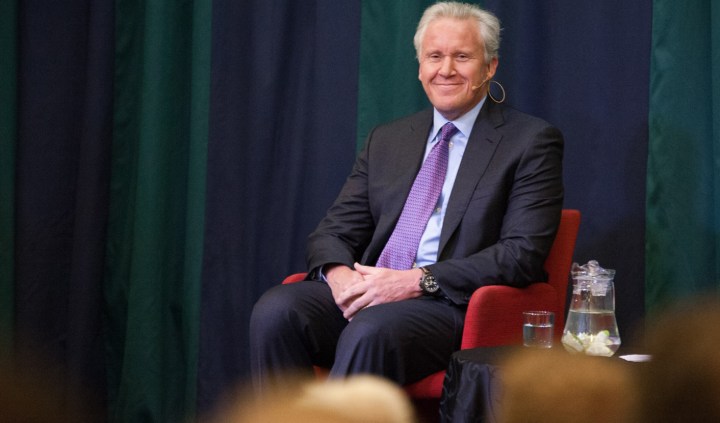Business Maverick
GE’s Jeffrey Immelt: Africa should do the easy things first

Last night, Jeffrey Immelt, CEO and chairman of GE, the world's largest infrastructure and technology company, spoke in Johannesburg. GREG NICOLSON was there to hear the influential American's thoughts on Africa, advice for South Africa, and tips for being a leader in uncertain times. And, of course, Eskom.
Speaking to an overcrowded auditorium at University of Pretoria’s Gordon Institute of Business Science (GIBS), Immelt recalled two proposals on how to fix problems in Africa. One was in an unnamed country where a leader presented an elaborate, almost impossible-to-understand plan to address energy shortages. Immelt responded by asking why they didn’t just change the light bulbs. The other was in Egypt after Hosni Mubarak left government in Egypt in 2011. Business leaders were brought in to see how they could help the changing country and Immelt was handed a 200-page McKinsey report. What about solutions we can implement now, he asked.
“That’s Africa. Always do the easy things first,” he said. “Always do things that can be done quickly, always be practical.”
Immelt is at the table of decision-making. The 58-year-old has led GE, which employs over 300,000 people in 130 countries and has a market capitalisation of $240 billion, since September 2001. He’s been named the world’s best CEO three times by financial journal Barron’s and chaired President Barack Obama’s Council on Jobs and Competitiveness, a sometimes awkward marriage of business and democratic reform.
Last year, GE announced it would invest $2 billion in Africa and has been contracted to provide 465 of 1,064 of the trains being supplied to Transnet. Last year the company announced it would invest R700 million in South Africa for both research and development and to support the growth of small and medium businesses. These initiatives helped Immelt earn a gong at the inaugeral Siyabonga awards in 2014, which recognise companies, NGOs and individuals helping grow the South African economy.
Immelt seems realistic about both the opportunities and risks of investing in Africa. Every time he comes to South Africa, problems with Eskom are in the newspapers, he said, noting the lack of electricity supply across the continent. The energy supplier needs to focus on short-term improvement but maintain stability. Eskom has said load shedding, which reached stage two on Monday, is necessary to avoid a complete blackout.
“It didn’t get created overnight and it’s not going to get fixed overnight,” said Immelt of South Africa’s energy problems. He emphasised stability should trump improvement in the short term. Asked whether he was in the country discussing GE providing nuclear energy, which South Africa is looking to procure at a cost of up to R1 trillion, he said, “Nuclear is going to have its day but it’s a really hard thing to do. I mean, on a scale of zero to 10, building a nuclear power plant is a 12. I go back to, not just in South Africa but in Africa, always [doing] the easy thing first. Always start with those things that can be managed, can be done can be grasped, and once you get those things, do the really hard stuff.”
He didn’t, however, say whether he might have discussed nuclear energy with government.
Immelt was unequivocal, though, that GE needs to continue investing in Africa, particularly in resource-rich countries and those with significant populations. When he started as CEO in 2001, he said African markets were classified in the ROW (rest of the world) category and staff servicing the continent were based in Dubai.
That’s changed, he said. Using the example of Nigeria, he said a company of GE’s size should take the risk. “If we’re right in Nigeria, we’re going to do great. If we’re wrong, we’re going to lose an acceptable limit for a company our size.” He added, “South Africa used to be optional. Now it’s mandatory.”
Immelt said since 2008 the global economy has faced uncertainty and slow growth, which is likely to stay. Changes in commodity prices, particularly the drop in oil, raises questions for African economies. “Do people run? Do they stay? Which countries will do better?” he asked of investors in the continent. “My own personal sense is: Africa will do okay.”
Asked by Corruption Watch’s David Lewis about how the perception of the South African government affects investment, Immelt didn’t talk about the country explicitly but compared companies to countries. “Bad government is a sickness. Corruption is such a bad thing […] There’s nothing that steals more from the common person than that.”
“The world’s biggest problem today is that there are not as many jobs as people seeking them,” he said.
“Jobs trump everything,” Immelt claimed, noting rising inequality and the need for companies to focus on employment in their corporate social responsibility projects.
On South Africa, the CEO argued that the best thing that could help the country’s economy would be greater regionalisation. SA has the industrialisation, the skills and the rand is weakening, but it could improve from growing its market to regional consumers, said Immelt, citing what has often been claimed but not really enacted.
While Immelt talked mostly about African, American, global and GE economics, the event was focused on leadership. The CEO effortlessly switched between humour and discussing the challenges of running one the world’s biggest companies. As a leader, you shouldn’t aim to be perfect, but aim never again to be as dumb as today, learn fast and adapt quickly, he said.
“What’s the toughest part of running a global company?” Immelt was once asked.
“Pretending to give a shit about soccer,” he responded. DM
Photo: GE CEO Jeffrey Immelt waiting to address the audience in Johannesburg, 26 January 2015. (Greg Nicolson)




















 Become an Insider
Become an Insider